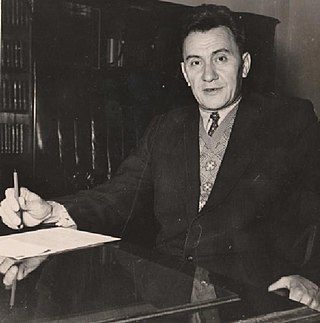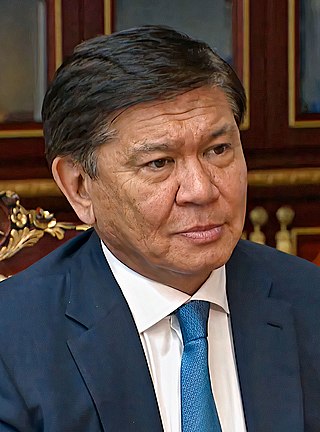| ||||||||||||||||||||
| Turnout | 88.23% | |||||||||||||||||||
|---|---|---|---|---|---|---|---|---|---|---|---|---|---|---|---|---|---|---|---|---|
| ||||||||||||||||||||
| ||||||||||||||||||||
 |
|---|
|
Presidential elections were held in Kazakhstan for the first time on 1 December 1991. [1] Nursultan Nazarbayev was elected with 99% of the vote, based on a turnout of 88%. [2]
| ||||||||||||||||||||
| Turnout | 88.23% | |||||||||||||||||||
|---|---|---|---|---|---|---|---|---|---|---|---|---|---|---|---|---|---|---|---|---|
| ||||||||||||||||||||
| ||||||||||||||||||||
 |
|---|
|
Presidential elections were held in Kazakhstan for the first time on 1 December 1991. [1] Nursultan Nazarbayev was elected with 99% of the vote, based on a turnout of 88%. [2]
On 24 April 1990 the Supreme Council of the Kazakh SSR established the post of President of the Kazakh SSR and chose its chairman Nursultan Nazarbayev to be the president for a term of 6 years. [3]
Due to the preceding events of the collapse of the Soviet Union, on 16 October 1991 the Supreme Council of the Kazakh SSR set the election day for 1 December. The law established requirements for a 100,000 signatures in order to be qualified to be a presidential candidate, which coincided with the requirements of the relevant law of the Russian SFSR, although the population of the Kazakh SSR was several times smaller. [4]
On 24 October 1991 Nazarbayev was registered by the Central Election Commission to be the incumbent candidate with his running mate Yerik Asanbayev as vice president to be on a secret ballot. [5] [6]
The members of the Supreme Council proposed a writer, Olzhas Suleimenov, to be the candidate but he declined the offer. Hasen Qojahmetov, leader of the Jeltoqsan National Democratic Party, did not have the required number of signatures for the election. [7]
| Candidate | Party | Votes | % | |
|---|---|---|---|---|
| Nursultan Nazarbayev | Independent | 8,681,276 | 98.78 | |
| Against | 107,252 | 1.22 | ||
| Total | 8,788,528 | 100.00 | ||
| Valid votes | 8,788,528 | 100.00 | ||
| Invalid/blank votes | 198 | 0.00 | ||
| Total votes | 8,788,726 | 100.00 | ||
| Registered voters/turnout | 9,961,242 | 88.23 | ||
| Source: Nohlen et al. | ||||

Nursultan Abishuly Nazarbayev is a Kazakh politician and military officer who served as the first President of Kazakhstan, in office from the country’s independence in 1991 until his formal resignation in 2019, and as the Chairman of the Security Council of Kazakhstan from 1991 to 2022.

Dinmukhamed Akhmetuly "Dimash" Kunaev was a Kazakh Soviet communist politician who served as the First Secretary of the Communist Party of Kazakhstan.

The Parliament of the Republic of Kazakhstan is the bicameral legislature of Kazakhstan. The lower house is the Mazhilis, with 107 seats, which are elected to five-year terms. The upper house is the Senate, which has 47 members.

The "Auyl" People's Democratic Patriotic Party or simply as Auyl ("village"), is a political party in Kazakhstan. It was originally founded by Gani Qaliev on 30 January 2000 as the "Auyl" Peasant Social Democratic Party before eventually merging with the Party of Patriots of Kazakhstan on 5 September 2015. The party is currently led by Senator for Turkistan Region Äli Bektaev from August 2015. With a membership of around 300,000 people, Auyl has participated in every Kazakh parliamentary election since 2004 and nominated presidential candidate Toleutai Raqymbekov in the 2019 presidential election. It first entered the Mäjilis at the 2023 legislative election, winning eight seats and becoming the largest opposition party.

Presidential elections were held in Kazakhstan on 4 December 2005. Incumbent president Nursultan Nazarbayev, in power since 1989, sought and won a 3rd term against four other candidates. Opposition candidates were allowed some access to the mass media, but this was still restricted. According to western election observers, opposition candidates also suffered considerable harassment. The Organization for Security and Co-operation in Europe (OSCE) criticized the elections, calling them unfair, but noted improvements.

Zharmakhan Aitbaiuly Tuyakbay is a retired Kazakh politician. He was the chairman of the Nationwide Social Democratic Party from 2007 to 2019 and prior to that, he served as the Mäjilis chairman from 1999 to 2004.

Ermukhamet Qabidenuly Ertisbaev is a Kazakh politician and diplomat who has served as the chairman of the People's Party of Kazakhstan since 27 March 2022. Prior to that, he served as the Kazakh ambassador to Belarus from November 2017 to August 2019 and to Georgia from April 2013 to November 2017.

Sergey Alexandrovich Tereshchenko was a Kazakh politician. He served as Prime Minister of Kazakhstan from 16 December 1991 to 12 October 1994.

Snap presidential elections were held in Kazakhstan on 26 April 2015 to elect the President of Kazakhstan. This was the fifth presidential election held and second without having any formal opposition candidates. With the highest-ever nationwide turnout of 95.2%, the result was a victory for long-term incumbent President Nursultan Nazarbayev of Nur Otan who received 97.8% of the vote, the largest since 1991, thus winning a fifth term in office while his closest challenger, Turgyn Syzdyqov, received only 1.6% of the votes.

Legislative elections were held in Kazakhstan on 20 March 2016. The date was set by president Nursultan Nazarbayev on 20 January 2016, when he dissolved the Mazhilis after it had requested dissolution on 13 January, with the reason cited being the economic crisis caused by low oil prices. Normally, the term of the Mazhilis would have expired in fall of 2016.

Independence Day of Kazakhstan is the main national holiday in the Republic of Kazakhstan, celebrated annually on 16 December.

The Aibyn Presidential Regiment of the State Security Service of Kazakhstan is a ceremonial honor guard of the State Security Service of Kazakhstan. It is comparable to the Kremlin Regiment in Russia and the Azerbaijani National Guard.

Snap presidential elections were held in Kazakhstan on 9 June 2019 to elect the President of Kazakhstan following the resignation of long-term President Nursultan Nazarbayev in March 2019. This was the sixth presidential election held since Kazakhstan's independence. The elections were not free and fair, and were widely denounced as a sham. Acting president Kassym-Jomart Tokayev of Nur Otan won the election.

Legislative elections were held in Kazakhstan on 10 January 2021 to elect the members of the Mäjilis. This was the 8th legislative election in Kazakhstan's history since its independence. It coincided with the 2021 local elections. This election marks the first to be held under Kassym-Jomart Tokayev's presidency and the first since 2004 to be held at the normally scheduled date, rather than due to an early dissolution of the Mäjilis.

Serikbolsyn Abdildauly Abdildin was a Kazakh economist, politician, First Secretary of the Communist Party from 1996 to 2010, member of the Mazhilis from 1999 to 2004 and a candidate in the 1999 presidential election. He is often described as "patriarch" for the formation of parliamentarism and the first-drafted Kazakh Constitution in early years of independence. While proclaiming himself as a Communist, Abdildin was vivid supporter for democracy and has called for reforms for a multi-party system with a rule of law.
The Jeltoqsan National Democratic Party was an unregistered political party in Kazakhstan. The party was founded on 31 May 1990 by a group of victims of the Jeltoqsan protests that took place in 1986. Its first leader was Hasen Qojahmetov, who was Kazakh nationalist, composer, former political prisoner and the Jeltoqsan protest participant. The main purpose of the party was to free the remaining Jeltoqsan victims from prison, form an independent Kazakhstan, and create a multi-party parliamentary system in the country.

Presidential elections were held in Kazakh SSR on 24 April 1990 to elect the president for a six-year term. Chairman of the Supreme Council Nursultan Nazarbayev was chosen to be the president by 317 of the 360 members. The election was uncontested.
Engels Gabbasuly Gabbasov was a Kazakh politician and writer who was a Senator for West Kazakhstan Region from 1995 to 1999. Prior to that, he was a member of the Supreme Soviet of Kazakhstan from 1994 to 1995. Gabbasov was a candidate in the 1999 Kazakh presidential election for the People's Union of Kazakhstan Unity.

The Special Forces of Kazakhstan trace their history to the Soviet era spetsnaz units operating on the territory of the Kazakh Soviet Socialist Republic within the USSR. These units are the remnants of the former Soviet Army, KGB, the Ministry of Internal Affairs and GRU. Similarly to other post-Soviet states, Kazakhstan's special forces fall under the control of the Armed Forces of the Republic, the Ministry of Interior, and under the National Security Committee. Special Forces Day is officially celebrated on June 9, in honor of the signing by the President of Kazakhstan Nursultan Nazarbayev of the decision on the formation of the Coordinating Council of Special Purpose Units of State Agencies under the Security Council.
The Kazakh democracy movement is a series of political movements in Kazakhstan that are supported by opposition groups and civil activists which are seeking for reforms in Kazakhstan's current political system, formed from 1991 after the country gained its independence from the Soviet Union and became a sovereign state by advocating for a democratic, multi-party, parliamentary system.